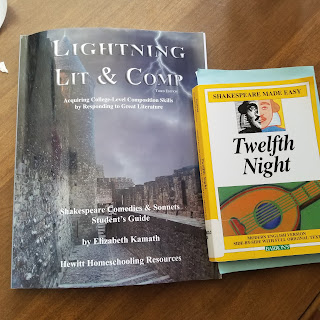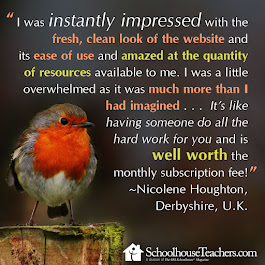Hewitt Homeschooling offers a full range of language arts curriculum packages for all grades in their Lightning Lit series, as well as resources for unit studies, state studies, and more. The Lightning Literature series has studies designed for elementary, junior high, and senior high students. The focus is on whole books and classic literature, teaching deep reading and writing skills, and building a love of reading and learning. Each of the Lightning Lit studies for high school students is an in-depth focus on reading and writing, and are designed to be completed in one semester. Each centers on a particular time and place, author, or subject. The guides includes biographies of authors, comprehension questions, writing exercises, discussion questions, and additional reading suggestions.
- Twelfth Night
- As You Like It
- A Midsummer Night's Dream
- The Merchant of Venice
The study begins with a thorough introduction explaining how and why to read literature and poetry, and the basics of writing a good paper. The Student Guide is written directly to the student, and includes an overview of how to use the guide and some suggestions to enhance the study. The introduction also includes background information on William Shakespeare and why reading and watching his work is rewarding and valuable. After some final thoughts on how to read Shakespeare, and how to approach the lessons, the student gets started on the first unit - Twelfth Night.
Each unit begins with the study of one of the comedies, and ends with a study of two of Shakespeare's sonnets. There is background information on the play, a plot summary, comprehension questions, a literary lesson, and finally a selection of writing exercises. There are generally at least nine or ten writing assignments to choose from, but it's suggested that the student choose two of the papers for each play, and one for each sonnet.
How did we use it? We actually started at the beginning of the book, and Kennady spent some time reviewing how to read literature, how to read poetry, and the information on writing good papers, then starting reading up on the background information about Shakespeare and his influence on the English language. Although she's studied one play already this year (Julius Caesar), we didn't spend time on the language particular to plays, so much of the background on blank verse, soliloquies, asides, and stage direction was rather new. The overview of the rhetorical and figurative language devices used in plays and sonnets was helpful as well.
Since we had vacation and other commitments interrupting our study, we chose to generally follow the slower pace of the full-year schedule for this course. So after the background, we got started on Unit 1 - Lesson 1 and begin reading Twelfth Night. This is the first Shakespeare play I remember studying while in high school, so it brought back memories! If you're not familiar with the play, it is a comedy about mistaken identities and finding love in unexpected ways. I allowed Kennady to read the play on her own, although I did find a video version of the play that we watched as we followed along in the script on occasion.
We used the Comprehension Questions given in the Student Guide (with answers given in the Teacher's Guide) and the Writing Exercise prompts as discussion starters, talking about the action of the play to make sure Kennady was understanding it. The plot summaries in the Student Guide helped out when the language was unfamiliar, and we appreciated that the Act and Scene references are given for each of the questions, making it easy to look up the portion of the play being discussed. The Literary Lesson section for Twelfth Night talks about the major themes in the play - love; appearance versus reality; festival and fun - the major characters; and the most prominent language devices - antithesis; irony; and poetry and prose.
Examples of the writing exercises for this play include: analysis of a supporting character; an opinion paper on a humorous quote from the play; a research paper on Elizabethan music; a short story about one of the characters; and a paper outlining an alternative time and setting for the play. Kennady chose the short story assignment, and an opinion paper on which of the three couples in the play are the best match.
Unit 1-Lesson 2 is a study of Sonnet 27 and Sonnet 28, with a two-page literary lesson examining the language of the two sonnets and a brief contrast of the two. There are six writing exercises to choose from in this lesson, including: a rewrite of the sonnets in prose form; an original sonnet, poem, or short story; and a letter in response to the sonnets. Kennady chose to write a short story personifying night and day. The unit ends with a lesson on Elizabethan Theater. It's strongly encouraged that students attend a performance of Shakespeare at a similar intimate theater in order to appreciate the plays in the setting they were written for.
The Teacher's Guide includes grading tips and templates for both fiction and non-fiction papers, suggested schedules for completing the study in one semester or over a full year; answers to the comprehension questions; and further discussion questions and project suggestions.
What we liked best:
- wide variety of choices for writing assignments
- good plot summaries and explanations of the plays, without dumbing it down
- challenging assignments that prepare students for college
What I need to mention:
- while the sonnets (and other short reading selections) are included in the Student Guide, the full-length plays and novels studied will need to be purchased or borrowed. Hewitt Homeschooling does provide Literature Packs which do include the Student Guide, Teacher Guide, and the novels.
Our bottom line: We are enjoying this particular Shakespeare study, and even though it's recommended for 11th and 12th grade students, we found it a good introduction to in-depth study of Shakespeare's plays. The writing assignments are quite challenging, however, and we're choosing to do only one or two in each unit. Lightning Lit consistently provides thorough studies of literature and writing assignments that stretch students; so I recommend them for students that enjoy reading and are up for a literary challenge.
Do Lightning Lit studies spark your interest? Here's what you need to know:
Visit the website: www.HewittHomeschooling.com/
Get more information about all the Lightning Lit & Comp series on the Lightning Literature page.
We previously reviewed Lightning Lit: American Mid-late 19th Century (high school) and Lightning Lit: 7th Grade.
Pricing: The Lightning Literature and Composition Pack: Shakespeare Comedies & Sonnets is available for $62.01. This Pack includes the Student Guide, Teacher's Guide, and all four plays in paperback. The Student Guide and Teacher's Guide may also be purchased separately.
Age Recommendation: Shakespeare Comedies & Sonnets is best for students in 11th or 12th grade. Lightning Lit studies are available for students in all grade levels.
Visit the Homeschool Review Crew blog for more information and to read other reviews. Crew members reviewed several other Lightning Lit titles, so be sure to check out all the reviews!
©2006-2017 Homeschool Coffee Break. All rights reserved. All text, photographs, artwork, and other content may not be reproduced or transmitted in any form without the written consent of the author. http://kympossibleblog.blogspot.com/
I have done my best to provide accurate pricing and links at the time this post originally appeared. Please be aware that these may change.














































0 comments:
Post a Comment
I love comments! It's like visiting over a virtual cup of coffee.